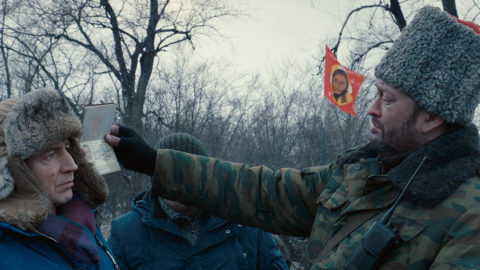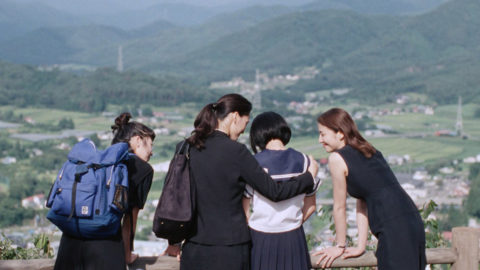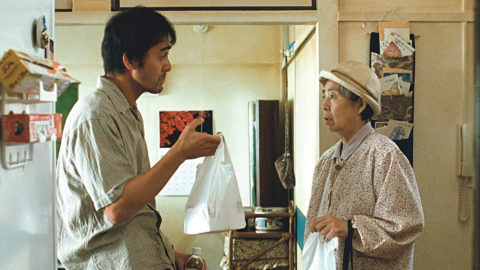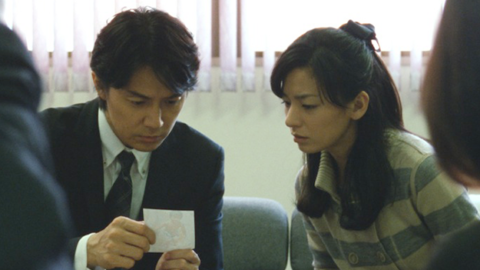Film of the Week: The Third Murder
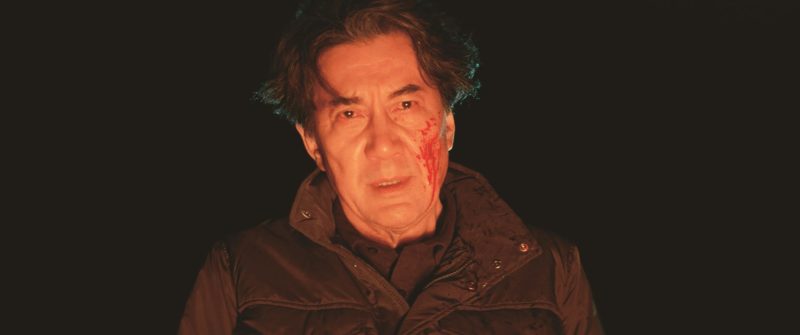
Much of the action in Hirokazu Kore-eda’s The Third Murder is seen from one side or another of a pane of glass. It’s the partition in a jail interview room, separating a prisoner and his attorney. The implication is clear: there are different truths to a legal case, and what they are depends on which side of the glass you happen to sit. Much the same is true when it comes to appraising Kore-eda’s film: considered from one angle, The Third Murder is a complex, alluringly elusive affair; from another, it’s merely slippery and nebulous, gesturing at profounder insights than it delivers. Kore-eda’s virtue as a formidably talented director and writer is to make his film appear perhaps more substantial than it finally is. The risk in making a legal drama this ungraspable is that viewers may hesitate to venture a clear verdict: it’s the sort of film on which you can expect the jury to be out for some time.
In reality, some reviews of The Third Murder, following its premiere in Venice last year, were dismissive; some more recent ones, notably in the U.K., have been rapturous. I’ll take the skeptical middle line. The Third Murder is an elegant, commanding film, altogether engrossing, but not terribly affecting—and at the end, you’re not entirely sure what you’re coming away with. Perhaps what’s most fascinating about the work is that overall, it’s entirely atypical for Kore-eda, yet unmistakably a Kore-eda film in many ways.
Major filmmakers with a distinctive style and set of preoccupations are sometimes tempted to make an odd-one-out statement, a piece strikingly out of key with their others: you might call The Third Murder Kore-eda’s Under Capricorn or The Straight Story. His specialty, from 1995’s Maborosi to this year’s Cannes Palme d’Or winner Shoplifters, through the recent likes of After the Storm (brittle, tart) and Our Little Sister (awkwardly precious), has been the pensive, empathetic observation of family relationships in particular, the intimate emotional sphere in general. The Third Murder is, as the title suggests, somewhat different, although the same concerns are still present.
The opening makes you wonder whether you’re really watching a Kore-eda film. On a piece of Yokohama riverside wasteland at night, a man clubs another to death, then sets his body alight, sparks flying poetically into the black sky. The killer is a middle-aged factory worker, Misumi (Koji Yakusho), his victim one Yamanaka, the boss who recently fired him. Shigemori (Masaharu Fukuyama) is a defense attorney brought onto the case, already in progress, by an older partner—the enduring complication of the affair being that Misumi keeps changing his story. He has confessed to the killing and to taking Yamanaka’s wallet: somewhat obscurely, the question of whether Misumi gets the death penalty hangs partly on the question of whether the crime was “robbery-murder” or “murder with theft,” i.e., which act came first. Misumi previously went to prison years earlier for killing two loan sharks, and Shigemori’s father was the judge at his trial. Shigemori tries to uncover the truth, but Misumi keeps presenting new possible motives: yes, he killed for money to cover his gambling debts; no, it was the victim’s wife Mitsue (Yuki Saito) who asked him to do it.

To complicate matters, Misumi had some sort of connection with Yamanaka’s teenage daughter Sakie (Suzu Hirose, from Our Little Sister). Just to show how difficult it is to pin down truth and falsehood in this story, Sakie walks with a limp that she supposedly has had since birth—although she has always insisted that she acquired it in an accident. When it comes to her testimony, can Sakie be considered a reliable witness? Is anyone in this story reliable? For that matter, is the film itself? At one point, Misumi changes his plea and insists that in fact he never killed Yamanaka—and Kore-eda goes on to show someone else doing the deed in eerie, lyrical slow motion, to a decorous string-and-piano theme by composer Ludovico Einaudi. It’s one of several rather soft-edged sequences that are variously imagined, dreamed, or entirely hypothetical. But wait—we unmistakably saw Misumi commit the crime at the start, didn’t we? Or did we? Can we be certain that that opening sequence is any more real than the rest?
This sort of narrative relativism makes The Third Murder a frustrating affair. It’s one thing for a drama to propose a series of alternative takes—contradictory angles on the same supposed event—quite another to fog the air with what feels like a noncommittal dreaminess. You feel that Kore-eda is not placing his cards on the table with absolute candor. He’s not actually obscuring the facts that emerge, not really playing a deceitful sleight of hand; it’s more as if, with that evocative lyricism, he’s making vague, magicianly flourishes in the air, playing an illusionist rather than actually performing illusions.
The principal deception that Kore-eda pulls off is simply the time-honored art cinema trick of making us think we’re watching a crime thriller when really what’s at stake is dramatized philosophical speculation—in this case about personal responsibility, the nature of justice, the question of moral truth as opposed to legal truth. The focus of the debate is the series of interviews between Shigemori, alone or with colleagues, and the ever-enigmatic Misumi, played by Yakusho (star of, among others, The Eel, 13 Assassins, and Tokyo Sonata). Shigemori (Fukuyama, seen in Kore-eda’s Like Father, Like Son) is a coolly efficient career lawyer determined to find the most effective strategy to avoid a death sentence for his client; the prosecutor in the case (Mikako Ichikawa) tells him that he’s the kind of lawyer that stops criminals from facing the truth of their actions. That doesn’t seem to apply to Misumi, however: he eventually tells Shigemori he’s not interested in strategy, he just wants to be believed. But which, of all his many stories, does he want believed?
Until he reveals a more anguished side, Misumi comes across as a Zen master, in terms of both sangfroid and mystification; he’s coolly affable, beaming placidly behind the glass. You wonder whether behind his monkish demeanor, he’s really satanic or at least sociopathic—a manipulative, possibly telepathic Hannibal Lecter to Shigemori’s captivated Clarice. Kore-eda revels in showing the latter increasingly perplexed as Misumi gnomically holds forth about the contradictions of judgment. Mikiya Takimoto’s camerawork also plays a lot of mirror games as the two men speak through the glass—sometimes, a little too pointedly, making their two faces overlap, the lawyer’s reflection mapping onto the prisoner.
The men are doubles in other ways. Shigemori at times almost exactly repeats things that Misumi has said—an effect that plays out among other characters too, so that you’re often in a state of déjà vu perplexity. Both men have daughters. Misumi’s adult daughter up north in Hokkaido has disowned him (she also, we’re told, walks with a limp like Sakie). And Shigemori has a teenage daughter (Aju Makita), whose acts of rebellion are manifestly designed to get attention from a workaholic father; the lawyer’s intimate scenes with her (tense) and with his dad (testily relaxed) are where the film becomes unmistakably Kore-edan. And between the two men is Sakie, who plays surrogate daughter to them both; Shigemori’s interviews with the girl (played by Hirose with a cool, opaque fragility) are some of the best, most stylistically heightened moments in the film, both characters shot frontally in searching close-up.
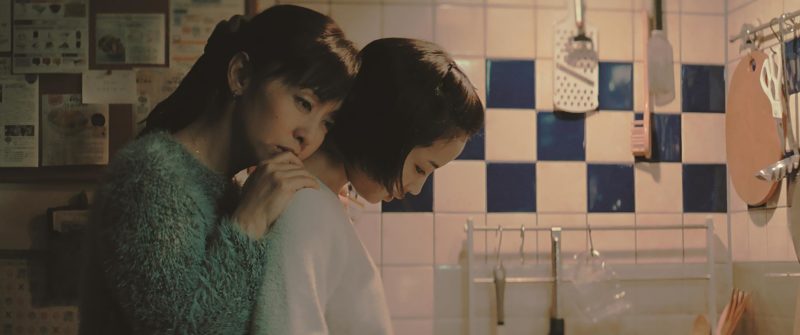
This is arguably the most stylistically pronounced of all Kore-eda’s films, in fact, perhaps to signify that we’re watching not just a genre film but a piece of meta-genre, concerned with what it means to watch and interpret a crime drama. Kore-eda and Takimoto favor symmetry, several shots showing three people lined up facing the camera. Elements of the mise en scène seem knowingly imported from the Hollywood legal thriller, as practiced by Preminger, Lumet, or Pakula: Shigemori’s office, with its arched windows and shabby staircase, which could easily be in San Francisco or Manhattan; the overhead shots of the courtroom, shafts of light slanting through the windows; scenes in which the lawyers mooch around the office after hours, mulling over developments, ties loosened over their waistcoats. And I can’t remember when I saw so many windows or reflective partitions in a film, in jail, courthouse, office, and diner alike, DP Takimoto adroitly wrangling the angles and reflections.
Given the baroque intricacy of Misumi’s case, it’s nevertheless surprising how compressed the story is, how few characters there are, how few elements finally come into consideration. An ostensibly simple crime story doesn’t preclude dense philosophical complexity—as witness Crime and Punishment and Camus’s The Stranger, either of which Kore-eda might have had on his bedside table when making this (“People’s lives get decided for them—unfairly!” complains Misumi, raging against what the latter writer would have called the Absurd).
What especially makes the film beguiling, and makes it at least feel complex, is the acting: Fukuyama’s increasing perplexity and vulnerability as Shigemori’s professional sleekness starts to crumble before Misumi’s endless shape-shifting; Yakusha’s lofty, otherworldly strangeness; a deeply odd performance of fragile, corrupt vacancy from Yuko Saito, as the victim’s widow; and gruff sageness from Isao Hashizume as Shigemori senior, at once beloved mentor and slightly embarrassing inconvenience to his son.
As for the philosophical content explicitly picks over in the film’s dialogue, it’s something for the viewer to digest, but it all seems a little leadenly expressed—and perhaps loses something in translation (the payoff lines about Misumi being a “vessel”). Not that the visuals too aren’t a little heavy-handed at times: a final overhead shot of the still perplexed attorney hovering literally at a crossroads isn’t what you’d think of as prime Kore-eda. Let the court take note.
Jonathan Romney is a contributing editor to Film Comment and writes its Film of the Week column. He is a member of the London Film Critics Circle.



